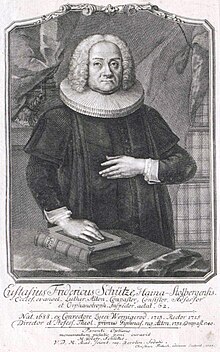Eustasius Friedrich Schütze

Eustasius Friedrich Schütze (born April 3 or April 13, 1688 in Hayn , † March 19, 1758 in Altona ) was a German Protestant theologian.
Live and act
Eusebius Friedrich Schütze was the son of the later deacon in Wernigerode Jeremias Schütze (1627–1709) and his wife Sophia Lucia Brosen. He received his first training from his father. In 1701 he came to Wernigerode , where he attended the school of scholars and was admitted to the university. During this time he lived in the house of the theologian and songwriter Heinrich Georg Neuss (1654-1716).
From 1708 he attended the University of Jena to study theology with Johann Franz Buddeus . He then moved to the University of Halle , where August Hermann Francke , Joachim Justus Breithaupt , Joachim Lange , Christian Benedikt Michaelis and Paul Anton were his teachers. After completing his studies, he took over the rectorate of the Lyceum in Wernigerode and became director of the institution two years later. During this time he made a contribution to the improvement of the school system and made a name for himself through some treatises.
In 1738 Christian VI appointed him . from Denmark as the first director and professor of theology to the newly founded academic high school in Altona. In 1740 he held the position of an adjunct to the pastor at the main church in Altona and took over his office after his death in 1741. In connection with this he became assessor at the consistory and inspector of the royal school for the poor and orphans. Since 1746 he was a foreign member of the Royal Prussian Society of Sciences .
From his 42-year marriage to Anna Elisabeth, the daughter of the councilor in Halberstadt Martin Schmidt, four sons were born. Gottfried Schütze became a professor at the learned school of the Johanneum in Hamburg , Immanuel Schütze (* 1716 in Wernigerode, † December 1, 1758) was Mayor of Altona, Ludwig Schütze (* 1722 in Wernigerode) held the post of sub-rector at the pedagogy from 1750 to 1752 , the preparatory school of the high school in Altona . Gottlob Schütze, the youngest son, was raised to the nobility as royal Danish legation secretary.
Works
- Progr. De meritis b. Lutheri in civitatem sacrem. Wernigerode 1717
- Progr. Exercitatico philologica de voce Echo. Wernigerode 1718
- Progr. De genthiliis veterum. Wernigerode 1718
- Progr. De discrimine sapientiae et prudentiae. Wernigerode 1719
- Progr. De confratribus in ministerio scholastico. Wernigerode 1720
- A heavenly mind; a presigt. Wernigerode 1722
- Progr. De quatuor temporum jejuniis, volgo Quatember. Wernigerode 1723
- Progr. De orgine vocis theotiscae Rode. Wernigerode 1724
- Progr. De jubilaeis gamicis. Wernigerode 1725
- Progr. De tentata unione inter Ecclesiam Graecam et Evangelicam. Wernigerode 1726
- Progr. An doctrina Muhamedica possit dict Theologia. Wernigerode 1727
- Progr. De vita et metris M. Andreas Schoppii. Wernigerode 1728
- Of the merits of Heinrich Horn, a witness to the truth. Wernigerode 1730
- Progr. De veritate semper victrioe. Wernigerode 1731
- Progr.de vita meritis M.Jö. Fortunati. Wernigerode 1735
- The fountain of grace and salvation for friends of God; a sermon. Wernigerode 1735
- The widow's class as a class of melancholy; a sermon. Wernigerode 1735
- Progr. De D. Bielefeldi in civitatem sacram meritis. Wernigerode 1737
- Progr. De studii sacrarum litterarum et utilitate et necessitato. Altona 1739
- A Protestant Christian boldly approaching Detfried Schützem's mercy seat in the New Testament; a sermon given to the king (of Denmark) on Gottorp. Altona 1740
literature
- Eduard Jacobs : Sagittarius, Eustasius Friedrich . In: Allgemeine Deutsche Biographie (ADB). Volume 33, Duncker & Humblot, Leipzig 1891, p. 138 f.
- Heinrich Doering: The learned theologians of Germany in the eighteenth and nineteenth centuries. Verlag Johann Karl Gottfried Wagner, 1835, Neustadt an der Orla, vol. 4, p. 53 ( online )
- Sagittarius, Eustachius Friedrich. In: Johann Heinrich Zedler : Large complete universal lexicon of all sciences and arts . Volume 35, Leipzig 1743, column 1403 f.
- Johann Georg Meusel : Lexicon of the German writers who died from 1750 to 1800. Publisher Gerhard Fleischer d. J., Leipzig 1812, vol. 12, p. 509, ( online )
- Christian Friedrich Kesslin: News from writers and artists in the county of Wernigerode from 1074 to 1855. Verlag Bänsch, Magdeburg, 1856 ( online )
| personal data | |
|---|---|
| SURNAME | Sagittarius, Eustasius Friedrich |
| BRIEF DESCRIPTION | German theologian |
| DATE OF BIRTH | April 3, 1688 or April 13, 1688 |
| PLACE OF BIRTH | Hayn (Harz) |
| DATE OF DEATH | March 19, 1758 |
| Place of death | Altona |